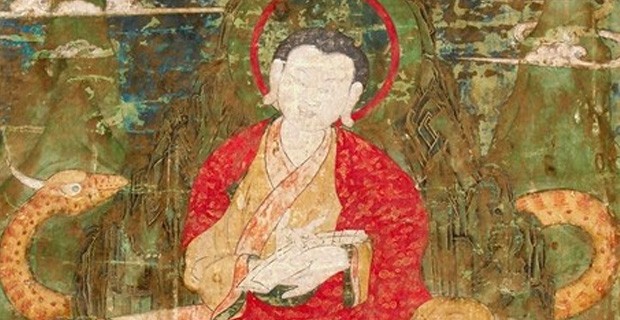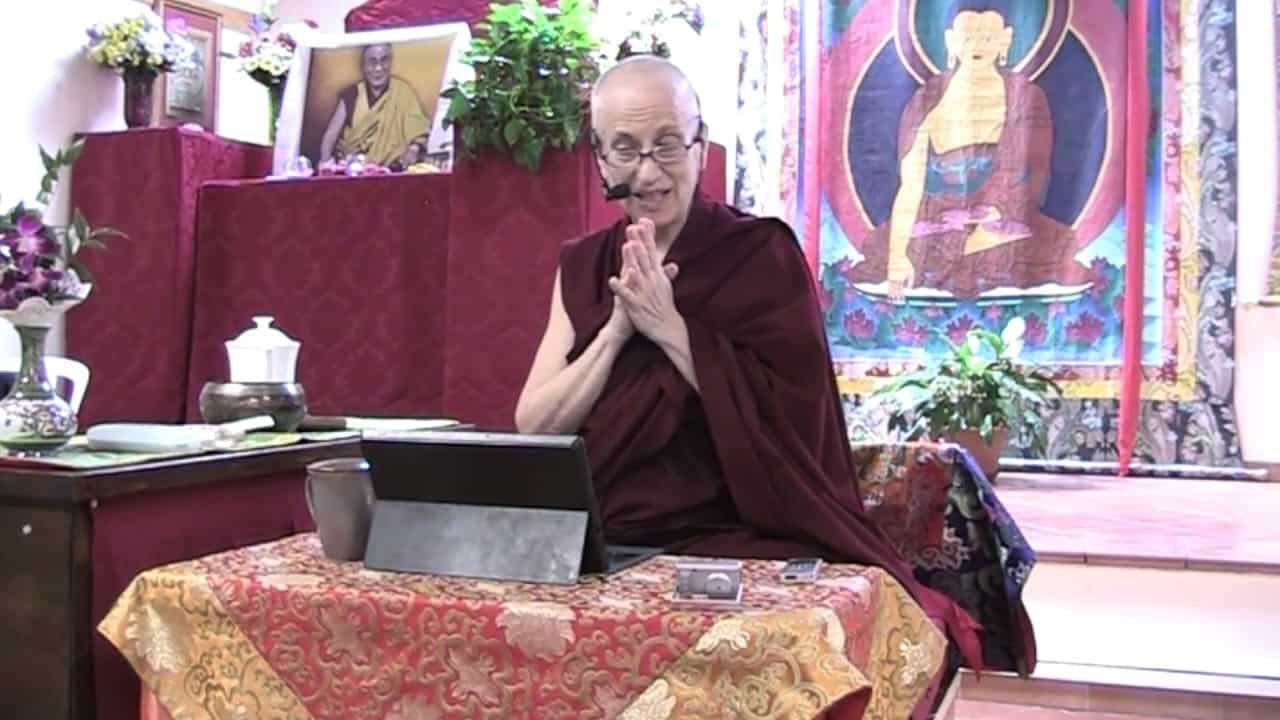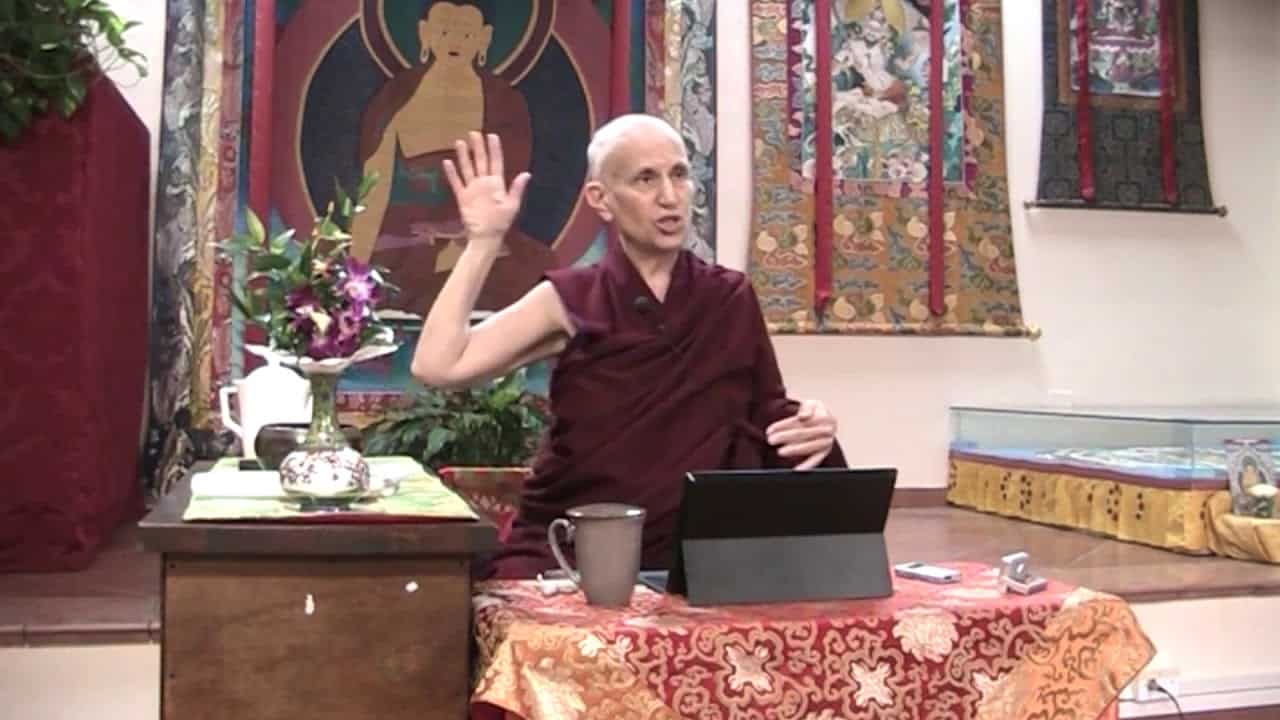Buddhist Advice for Ruling a Kingdom
Nagarjuna's Sage Guidance on How to Govern in Accordance with the Dharma

Venerable Nyima is a keen student of Venerable Chodron's Thursday night, live-streamed teachings on Precious Garland of Advice for a King by Indian master Nagarjuna.
Studying Nagarjuna’s Precious Garland has sparked my interest in looking at his work through the lens of current events. This blends well with some recent discussion online and at Sravasti Abbey regarding socially engaged Buddhism. The question is: Should—or to what extent should—Buddhist monastics and practitioners in general actively advocate for governmental policies based on equality, justice, peace, compassion, and care for the environment?
This question was answered many centuries ago by Nagarjuna, a Buddhist monk and philosopher who lived between 150 and 250 AD. In his text Precious Garland of Advice for a King, Nagarjuna not only instructs the king on profound Buddhist philosophical points but also advises him on how to rule the kingdom in accordance with the Dharma. In other words, Nagarjuna advocates for governmental policies based on Dharma principles. He tells the king:
125: …devote yourself to the Dharma of
generosity, ethical conduct, and fortitude.
126: King, if you undertake deeds that begin
with the Dharma, have the Dharma in the
middle and Dharma at the end, you will
not be harmed in this world or the next.
In order to understand Nagarjuna’s approach to advocacy I wanted to look not just at what he did, but also how he did it. I wanted to understand his motivation, to discern how he spoke to the king—in what tone, what words he used, and in what context. I also wanted to understand the actual content of his advice—what he focused on.
To explain his motivation, Nagarjuna tells the king:
301: If the king acts in a way that contradicts
the Dharma or does something that does
not make sense, most of his subjects still
praise him. Hence, it is hard for him to
know what is appropriate and what is not.
Who would dare disagree with a powerful king? People would be afraid of doing that and consequently the king would not benefit from honest feedback. Nagarjuna then poses a very pertinent question:
302: If it is even difficult to say something
beneficial but unpleasant to others,
how can I, a monk, hope to do so to you,
the king of a large realm?
This question is a preamble for outlining his motivation in offering advice to the king, which Nagarjuna presents as follows:
303: But because of my affection for you,
and also due to my compassion for beings,
I myself will tell you what is quite helpful
but not very pleasant.
It is clear that Nagarjuna cares for the king and wants him to govern his realm well. But he does not stop there; Nagarjuna tells the king to look beyond his own narrow interests and broaden his scope of care and concern to include the whole world.
306 Realizing that what I tell you is helpful
in this context and others,
implement it for your own sake
and also for the sake of the world.
Similarly, when we engage in advocacy, we should follow Nagarjuna’s example and do it with the motivation of benefitting everyone involved, including policy-makers and those who think differently from us. Being keenly aware of our interdependence, we should likewise broaden our scope of care and concern to include the whole world.
Nagarjuna’s words to the king were spoken in a friendly tone, conveying respect and caring for the king’s well-being as well as a deep understanding of the king’s role and responsibilities. Nagarjuna didn’t shy away from difficult topics. Again, this is an example for us in that our advocacy efforts should be free from animosity and divisiveness and instead focus on building common ground and understanding among different groups of people.
Nagarjuna’s advice is clear, concise, direct, and touches upon the king’s most important spheres of influence. Regarding policy-making, he says:
128: Dharma is the highest policy;
Dharma pleases the world;
and if the world is pleased,
you will not be deceived here or hereafter.
129: But a policy that proceeds without the
Dharma will not please the world.
And if the world is not pleased,
you will not be happy here or hereafter.
In terms of social policy Nagarjuna advises the king to invest in education and pay educators well; to take care of vulnerable populations such as the elderly, the very young and the ill; to pay doctors and other care providers with money from the king’s estates to ensure access to medical care for all his subjects. He suggests the king focus on enhancing the kingdom’s infrastructure and asks him to show compassion for the homeless, the poor, the ill, and all those facing hardships.
239: For the sake of increasing wisdom,
provide for the livelihood of the
schoolmasters in all the educational
institutions of the land and formally
grant estates to them.
240: With [the proceeds from] your fields establish
wages for doctors and barbers [dentists],
for the sake of the elderly, the young, and the ill
so as to relieve the suffering of sentient beings.
241: You of good wisdom, establish rest houses
and build parks and causeways, pools,
pavilions, and cisterns; provide for bedding,
grasses, and wood.
243: Out of your compassion, always care for the ill, the
homeless, those afflicted by suffering, the
downtrodden and unfortunate.
Respectfully apply yourself to aiding them.
Nagarjuna’s advice on economic policy focuses on reducing the burden of unnecessary taxes, tolls, and debt so the population can enjoy economic relief. He also encourages the king to help farmers facing hard times.
252: Provide seeds and food to farmers
who have fallen on hard times.
Eliminate excessive taxes and reduce
the portion [of products taxed].
253: Protect [citizens] from debt; eliminate [new]
tolls and reduce [excessive] tolls.
Eliminate the suffering of those who wait at
your door [with their petitions unanswered].
In regards to the criminal justice system, he asks the king to be compassionate with prisoners and to provide them with food, drink, medical care and clothing. Nagarjuna advocates for ongoing release of prisoners, particularly the ill, and discourages the use of unreasonably long prison sentences.
331: King, out of compassion you should always make your mind focused upon benefitting all beings, even those that have committed the most serious misdeeds.
332: You should particularly have compassion
for those that have committed the serious negativity
of murder;
these ones who have ruined themselves
are indeed worthy of a great persons’ compassion.
333: Either every day or every five days,
Release the weakest prisoners.
And see that it is not the case that the remaining ones
are never released, as is appropriate.
334: From thinking that some should never be released
you develop [behaviors and attitudes] that contradict
your precepts. From contradicting your precepts,
you continually accumulate more negativity.
335: And until they are released, those prisoners
should be made content
by providing them with barbers, baths,
food, drink, clothing, and medical care.
By way of foreign policy, Nagarjuna advises the king to care for refugees and offer assistance to countries hit by famine and disease. He describes a vast scope of international involvement for the king that is antithetical to waging wars.
251: Always care extensively for [places] in the world
that are oppressed or where crops have failed;
that have suffered harm or where there is plague,
or that have been conquered [in war].
Nagarjuna asks the king to extend his kindness and care to travelers who are tired, thirsty and hungry, to place not only water cisterns by the roads but also medicine, supplies, food, and other useful items. One could argue there is a contemporary parallel here in terms of showing kindness to immigrants who are very much like travelers coming from far away places hungry, thirsty, and tired.
245: At the sites of cisterns place shoes, parasols,
and water filters, tweezers for removing thorns,
needles, thread, and fans.
246: At the cisterns also place the three kinds of fruit,
the three kinds of salt, honey,
eye-medicine, and antidotes to poison.
Also write formulas for medicinal treatments and spells.
247: At the cisterns also place ointments for the
body, feet and head, cradles [for babies],
ladles, and ewers,
brass pots, axes, and so on.
248: In cool, shady spots make small cisterns
filled with potable water and provided with
sesame, rice, grain,
foods, and molasses.
There is also advice concerning care for animals, insects, and non-human beings in general. Here Nagarjuna asks the king to be generous with other beings, take responsibility for their well-being and act accordingly.
249: At the openings of anthills
have trustworthy persons
constantly place food and water,
molasses and and piles of grain.
250: Both before and after each meal
always offer in a pleasant manner
food to hungry ghosts,
dogs, ants, birds, and so on.
Nagarjuna encourages the king to appoint ministers who value ethical conduct and uphold high standards of conduct; to appoint military advisors who use resources wisely and are kind and vigilant; and to appoint officials who are skillful, knowledgeable and experienced.
323: Appoint as ministers policy experts who are
pious, polite, and pure, devoted,
courageous, of good family,
ethically outstanding, and grateful.
324: Appoint military advisors that are generous,
unattached, heroic, and polite,
who properly use [resources], are steadfast,
always vigilant, and pious.
325: Appoint as officials elders that behave in
accord with Dharma and are pure, who are
skillful and know what to do, who are erudite, organized,
impartial, and polite.
Nagarjuna also advises the king to be unselfish, honest, and generous. He tells the king that truth, generosity, tranquility and wisdom are four excellent qualities a king should have.
130: A useless [political] theory is one that
intends to deceive others. It is harsh and a
path to bad rebirths—how could the
unwise make such a theory useful?
131: Since that [deception] will just deceive
oneself for many thousands of rebirths,
how could one intent on deceiving others
be a true statesman at all?
To conclude, Nagarjuna provides an example of how to approach advocacy from a Buddhist point of view by having a proper motivation, avoiding animosity and divisiveness and advocating for issues related to the well-being of vulnerable populations be them domestic or foreign. Verses 133 and 342 summarize Nagarjuna’s advice well.
133: Be generous, speak gently, be beneficent;
act with the same intention [as you expect from others];
through these [ways of acting], bring together
the world, and also sustain the Dharma.
342: From reigning properly in this way,
your kingdom will not be chaotic.
It will not proceed improperly nor contradict the Dharma.
It will be in harmony with the Dharma.
For more about Nagarjuna’s Precious Garland, see Venerable Chodron’s series of teachings on the text.
Featured image of Nagarjuna by Himalayan Art Resources.
Venerable Thubten Nyima
Ven. Thubten Nyima became interested in Buddhism in 2001 after meeting a tour of monks from the Ganden Shartse Monastery. In 2009 she took refuge with Ven. Chodron and became a regular participant in the Exploring Monastic Life retreat. Ven. Nyima moved to the Abbey from California, in April of 2016, and took Anagarika precepts shortly thereafter. She received sramanerika and shiksamana ordination in March 2017 and full ordination in August 2023. Ven. Nyima has a B.S. degree in Business Administration/Marketing from California State University, Sacramento and a Masters degree in Health Administration from the University of Southern California. Ven. Nyima currently resides in Colombia.


